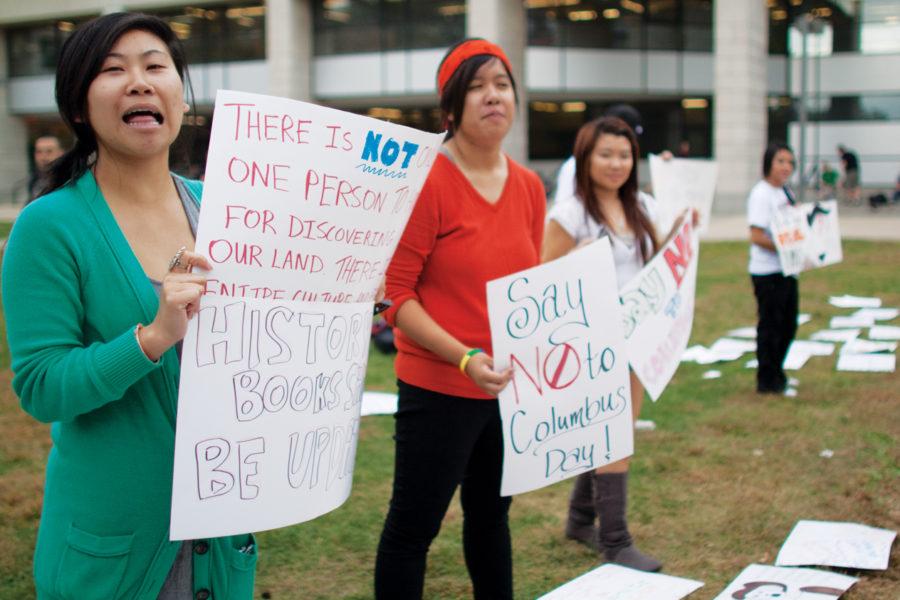Long: Learn a lesson from New York
Photo: Kelsey Kremer/Iowa State Daily
Naly Bounyalath, junior in agronomy, along with other Iowa State Students stand outside of the library for a protest calling for a reconsideration of Columbus day Monday, Oct. 11 in the free speech zone.
October 5, 2011
Protests are taking place all over the world. Looking at news headlines, Syria is moving closer to civil war, there is outcry in Italy over the acquittal of Amanda Knox, and 700 people were arrested on the Brooklyn Bridge. Wait, what?
That’s right, there are protests going on here in the United States, on a fairly large scale. No, they aren’t as large as some of the great protests in American history, such as the Million Man March on Washington. It’s just beginning to garner attention in some national news outlets, starting with an incident on the Brooklyn Bridge.
The Occupy Wall Street protests are spreading from New York City to other large cities in the country. The movement is in opposition to the way that business has been conducted on Wall Street recently, resulting in record income differential between the top 1 percent of earners and the other 99 percent. With the ability to record video on anything with a battery anymore, NYPD has been seen using an elevated amount of force (such as using mace on non-threatening protestors, in violation of NYPD’s official policies).
It is still too early to tell where these protests are going to go, and the situations are too complex to discuss in the space of this column. Originally, they seemed to lack leadership and strength, but recently several prominent unions have stepped up to help support the protests. Some are saying that this is the beginning of the formation of the counterbalance to the tea party.
I certainly hope not. The tea party is the worst thing to happen to American politics in the past decade, at least. The one-minded, radical movement that leaves no room for compromise is not conducive to doing politics. Having two movements that refuse to give any ground toward the other in the spirit of politics simply leads to yelling, screaming, name-calling and unbiased accusations.
That isn’t to say that those people shouldn’t be protesting. Protesting to affect an issue that resonates with you is absolutely important; it is the reason the founders protected freedom of speech and freedom of assembly in the Constitution. In fact, I’m honestly surprised and disappointed that this doesn’t happen more often in our country, and here at Iowa State.
It seems here at Iowa State that most people, for whatever reason, don’t care. They don’t care about national issues, which they don’t see as being important to their lives; they don’t pay attention to state and local level issues because they don’t see them on the “Colbert Report” or “The Daily Show,” so they must not be important. But where tuition has gone up by over 100 percent since 2000-01, what goes on in the statehouse drastically affects us.
Last year, ISU Ambassadors (of which I was a member) sponsored around 100 students to go down for Regent’s Day, to speak with legislators and try and get them to increase funding to Iowa State. Even that was tainted with controversy, as the ISU Republicans group came down to lobby for funding cuts.
But where was the outcry on campus? There was no ambition to try and influence policy or make noise here, students just seemed to lie down and take it. For a student like me (in-state, entering in fall 2008, four years of schooling to complete degree), the increases in tuition, not counting fees, has cost over $30,000 (cumulative). Imagine how much higher that is for the record number of out-of-state students we have on campus.
Yet, we do nothing. And it isn’t just on the state level at which our apathy is embarrassing, on the local level students are unengaged too. I doubt many students can name our Mayor (Ann Campbell) or any of our City Council members. The decisions these people make affect you on a day-to-day basis, and students could literally take over the government. No, I’m not advocating a city-wide revolution. But if students ran for the offices during the elections and the student body actually got out and voted, it would be a landslide victory. ISU students comprise of half the population in this town, there is no reason other than apathy that students couldn’t be represented at the local level.
Yet it still seems to me that most students that I try and engage in political discussions are disinterested. They don’t think it is their problem, or that they can do anything about it. And as far as impacting national level discussions, like the protests in New York are attempting to do, it is pretty unlikely that Iowa State can make a difference. But, we will never make a difference on the state or local level if we are afraid to say anything. So the next time that tuition increases or policies change around here, gather some friends and say something, or everyone here will pay the price.







